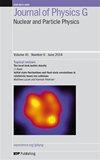色味锁定态夸克星物质与密度相关夸克质量模型
IF 3.5
3区 物理与天体物理
Q2 PHYSICS, NUCLEAR
Journal of Physics G: Nuclear and Particle Physics
Pub Date : 2024-04-28
DOI:10.1088/1361-6471/ad3975
引用次数: 0
摘要
在约束-异ospin-密度-质量(CIDDM)模型中,研究了零温情况下夸克星(QSs)中奇异夸克物质(SQM)和色香锁定夸克物质(CFL)的性质。此外,我们还考虑了 CFL 阶段新提出的质量半径约束条件,研究了 QS 的质量半径关系。我们的结果表明,在零温度下,通过考虑CIDDM模型中的CFL相,我们可以得到更稳定和更坚硬的状态方程(EOS)。虽然在SQM情况下,GW190814的质量约为2.6 M⊙的次级成分在CIDDM模型中不能成为QS,但在本研究中,通过在CIDDM模型中考虑CFL相,它可以被很好地描述为QS。结果表明,通过将配对能隙扩展到密度依赖性,CIDDM模型中的质量半径线可以满足最近脉冲星观测中大部分质量半径区域的约束。本文章由计算机程序翻译,如有差异,请以英文原文为准。
Quark star matter in the color-flavor-locked state with a density-dependent quark mass model
The properties of strange quark matter (SQM) and color-flavor-locked (CFL) quark matter are investigated in quark stars (QSs) at zero temperature case within confined-isospin-density-dependent-mass (CIDDM) model. The mass–radius relation of QSs are also studied by considering newly proposed mass–radius constraints in CFL phase. Our results indicate that we can obtain more stable and stiffer equation of state (EOS) by considering CFL phase within CIDDM model at zero temperature. While the GW190814's secondary component with a mass around 2.6 M⊙ cannot be QSs within CIDDM model in SQM case, it can be well described as QSs by considering CFL phase within CIDDM model in this work. In particular, we further construct a density-dependent pairing energy gap to connect the EOS of SQM and CFL quark matter with constant pairing energy gap Δ, and the results indicate that by extending the paring energy gap to include density dependence, the mass–radius lines within CIDDM model can satisfy most of the mass–radius region constraints in recent pulsar observations.
求助全文
通过发布文献求助,成功后即可免费获取论文全文。
去求助
来源期刊
CiteScore
7.60
自引率
5.70%
发文量
105
审稿时长
1 months
期刊介绍:
Journal of Physics G: Nuclear and Particle Physics (JPhysG) publishes articles on theoretical and experimental topics in all areas of nuclear and particle physics, including nuclear and particle astrophysics. The journal welcomes submissions from any interface area between these fields.
All aspects of fundamental nuclear physics research, including:
nuclear forces and few-body systems;
nuclear structure and nuclear reactions;
rare decays and fundamental symmetries;
hadronic physics, lattice QCD;
heavy-ion physics;
hot and dense matter, QCD phase diagram.
All aspects of elementary particle physics research, including:
high-energy particle physics;
neutrino physics;
phenomenology and theory;
beyond standard model physics;
electroweak interactions;
fundamental symmetries.
All aspects of nuclear and particle astrophysics including:
nuclear physics of stars and stellar explosions;
nucleosynthesis;
nuclear equation of state;
astrophysical neutrino physics;
cosmic rays;
dark matter.
JPhysG publishes a variety of article types for the community. As well as high-quality research papers, this includes our prestigious topical review series, focus issues, and the rapid publication of letters.

 求助内容:
求助内容: 应助结果提醒方式:
应助结果提醒方式:


